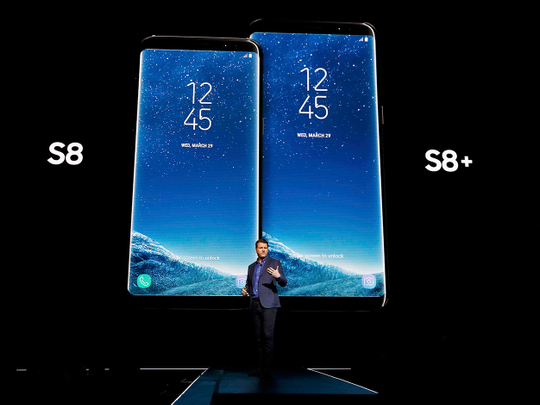
The world's biggest smartphone maker Samsung has unveiled its latest flagship, the Galaxy S8, on Wednesday in New York as it seeks to move on from last year's humiliating withdrawal of the fire-prone Note 7s.
Boasting some of the largest wrap-around screens ever made, the long-awaited S8 is the South Korean tech giant's first new premium phone since the Note 7 debacle in October, which wiped out $5.48 billion of profit and helped Apple overtake Samsung as the world's top smartphone maker in the fourth quarter.
These are the Galaxy S8 features we know so far from the Wednesday 'unpacking':
-
Comes in two sizes: Samsung Galaxy S8 and S8+
-
'Infinity' display (full-frontal edge-to-edge screen)
-
Bixby, a new interface on Samsung devices, to rival Apple's Siri
-
Ability to pair with the Gear VR with Controller or the new Gear 360.
-
Face recognition, iris scanner, Samsung DeX, Camera.
Two versions of the Galaxy S8, code-named Dream internally, were launched at a media event in New York on Wednesday, with 6.2-inch (15.75 cm) and 5.8-inch curved screens — the largest to date for Samsung's premium smartphones.
The phones, which will go on sale on April 21, are slightly longer but comparable in width to their predecessors as Samsung has eliminated nearly all of the bezel borders around the face to maximize the screen surface area.
Bixby
The S8 features Samsung's new artificial intelligence service, Bixby, with functions including a voice-commanded assistant system similar to Apple's Siri. There is also a new facial recognition application that lets users unlock their phones by looking at them.
Samsung is hoping the design update and the new features — nothing revolutionary but focused on making life easier for consumers — will be enough to revive sales in a year Apple is expected to introduce major changes to its iPhones for their 10th anniversary, including the very curved screens that have become staples of the Galaxy brand.
The S8 is also crucial for Samsung's image as a maker of reliable mobile devices.
The self-combusting Galaxy Note 7s had to be scrapped in October just two months after their launch and a failed attempt to recall the Note 7s in September was particularly damaging, investors and analysts say, leading to questions about the firm's credibility.
The time is now. Tune in. https://t.co/y3SLLSPtxK
— Samsung Mobile US (@SamsungMobileUS) March 29, 2017
Samsung responded by implementing new battery safety measures after an internal investigation identified battery problems from two different suppliers as the cause of the Note 7's problems.
Still, some analysts say consumers may be wary of potential safety problems with the S8.
"Initial sales of the S8 may appear slow compared to what was typical for previous model releases," said Lux Research analyst Christopher Robinson. "In other words, smaller initial sales spike."
Samsung's early marketing of the S8 has eschewed the safety issue, which brand experts say is an attempt to avoid reminding consumers of the images of burnt Note 7s that spread throughout the world's media late last year.
Chaotic recall
Samsung Electronics was forced to discontinue the Galaxy Note 7, originally intended to compete with Apple's iPhone, after a chaotic recall that saw replacement devices also catching fire.
The debacle cost the South Korean company billions in lost profit and hammered its global reputation and credibility, during a torrid period when it has also been embroiled in a corruption scandal.
Its vice-chairman Lee Jae-Yong, heir to the parent Samsung group, has since been arrested and indicted for bribery, along with four other senior executives, in connection with the graft scandal that saw ex-president Park Geun-Hye impeached.
Samsung blamed the Galaxy Note 7 crisis on faulty batteries, apologised to consumers for causing concern and was forced to postpone the S8 launch.
The Verge, a US-based online news network specialising on technology, described the new device as Samsung's "biggest test ever".
"It now needs to reassert its reliability while also rebooting its technological advantage," it said.
On its website, Samsung says the latest addition to the Galaxy lineup represents "the start of a new era", but has offered little information about its new hardware features.
Rear fingerprint scanner
The home button on the front of the phone appears to have been replaced by a fingerprint scanner on the rear, while it is also speculated to have an iris scanner, most likely used for unlocking the handset and authorising payments.
Samsung announced last week that its new voice-powered digital assistant Bixby will debut with the phone, which will have a set of pre-installed applications that will work with the interface.
The South Korean electronics giant late last year bought Viv, an artificial intelligence startup with co-founders who were part of the team that built virtual assistant Siri, which Apple bought some seven years ago.
The Galaxy S8 is expected to be available in late April with a price range of around $900 to $1,000.












